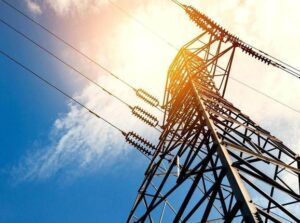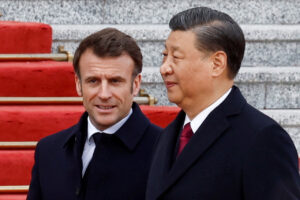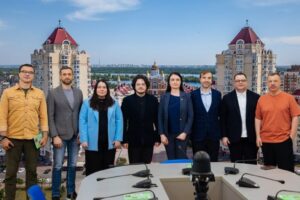
The National Bank of Ukraine (NBU), taking into account Russia’s recent terrorist attacks on energy infrastructure, has included in its macroeconomic forecast an average electricity deficit of about 5% in 2024-2025, while estimating electricity imports at $0.8 billion in 2024 and $0.6 billion in 2025.
“If there are no new significant destructions, the NBU estimates that the electricity deficit, even taking into account imports and partial restoration/installation of new generating capacities, will be 5-7% on average in the second to fourth quarters of 2024,” the NBU said in its April inflation report, which was recently released.
This means restrictions on consumption for both households and industry. Due to uneven consumption throughout the day during peak hours, the deficit may reach 25-30% and be higher in energy-deficient regions, the National Bank explained.
“The deficit will persist in 2025 (an average of 7% in the first quarter and 3% by the end of the year),” its experts believe.
According to the report, a significant electricity deficit is likely to occur in the second quarter of 2024 due to a decrease in floods and the need to repair nuclear power units. In the future, the electricity deficit may increase with increased consumption in the summer and during the heating season.
The NBU reminded that the integration of Ukraine’s power system with the European one allows for the import of 1.7 GW of capacity (as authorized by ENTSO-E), which is used to compensate for temporary shortages of generating capacity during peak consumption hours and to balance the power system. However, due to significant fluctuations in consumption, in particular in neighboring countries, the import capacity is likely to be less than the maximum volume. In addition, import coverage is limited due to imbalances in the grid, including low transmission capacity in some regions due to significant damage.
It is pointed out that the risk of increased Russian attacks on energy infrastructure remains high for both production and distribution capacities. In the event of further damage, GDP growth will be lower than in the baseline scenario (3% in 2024 and 5.3% in 2025), and price increases will be higher due to higher costs resulting from the use of more expensive energy sources.
“However, the level of readiness of businesses and households for potential electricity outages is higher than in 2022-2023, which will limit the negative impact of the electricity shortage on the economy,” the NBU said.

Oil prices are rising on Monday after the biggest drop since February in the previous week.
The cost of July futures for Brent on the London ICE Futures exchange as of 8:10 a.m. is $83.25 per barrel, which is $0.29 (0.35%) higher than at the close of the previous trading. On Friday, these contracts fell by $0.71 (0.9%) to $82.96 per barrel.
June futures for WTI in electronic trading on the New York Mercantile Exchange (NYMEX) have risen in price by this time by $0.3 (0.38%) to $78.41 per barrel. As a result of the previous trading, the value of contracts decreased by $0.84 (1.1%) to $78.11 per barrel.
Over the week, Brent fell by 6%, while WTI fell by almost 7%.
Last week’s pressure on the market was exerted by data on the growth of US stocks and signals of declining demand, as well as some easing of fears associated with the possibility of a reduction in oil supplies from the Middle East.
Traders believe that amid a significant decline in prices, OPEC+ countries will continue to limit production. The majority of traders and analysts surveyed by Bloomberg expect that the alliance countries that adhere to the voluntary production curbs will continue the current measures until the end of this year.
Saudi Aramco announced last weekend that it will raise oil prices for Asian buyers in June. The cost of the main grade supplied to Asia, Arab Light, will increase by $0.9 per barrel. As a result, it will cost $2.9 more than a basket of Omani and Dubai crude, Saudi Aramco said in a statement.

Raphaël Glucksmann, a member of the European parliament and the lead socialist candidate in France in the upcoming EU elections, has urged Emmanuel Macron to be “firm” against China and “not to remain silent in the face of the crimes” against the Uyghurs.
In an interview with France Inter radio on Monday morning he said it was wrong to roll out the red carpet in the way Macron has for the Chinese president.
“You can receive him, you can talk to anyone, but not like this. Not by taking him to the vacation village of his childhood, to his grandfather’s house, not, as the Élysée puts it, by giving this visit a friendly setting because Xi Jinping is not our friend. In addition to deporting the Uyghur people, repressing the Tibetans and Hong Kongers, suppressing opponents and threatening the Taiwanese.”
Glucksmann also claimed that China is killing French green tech putting solar panel companies out of business with its cut-price alternatives.
“We used to have solar panel champions in France and Europe. Today, how many companies produce solar panels in France? There’s only one left.
He added: “What I want for us is to no longer be the gall guys,” he said noting that when Canada sees distortions in trade with the Chinese it imposed tariffs of over 200%. “In Europe they charge 15%. That’s not a deterrent.”

On May 15 and 16, CEC Parkovy in Kyiv will host the second Ukrainian Construction Congress, which this year has significantly expanded, consolidated the Ukrainian government, business, public organizations and structures and will become a platform for a number of events of international and Ukrainian organizations.
In addition to its own program, which will consist of discussion panels, speeches and presentations by experts in various fields, the Second Ukrainian Construction Congress will include its own events by the Association of Small Cities of Ukraine, which will bring together 200 heads of communities and present the Supermarket of Solutions for Communities platform, which will enable businesses to enter the municipal market, the Association of ATO Veterans, whose participants will discuss veteran entrepreneurship, as well as events of the Union of Real Estate Professionals and the International Business Community Board.
According to Oksana Zholnovych, Minister of Social Policy, there are 3 million people with disabilities in Ukraine, and this number is constantly increasing, including due to the hostilities. Therefore, the key topic of the Congress will be the restoration of Ukraine with regard to barrier-free and inclusive development.
The Congress will traditionally become a platform for constructive dialogue, exchange of views and ideas between the government, developers, architects, builders, manufacturers of construction materials, the public sector and other industry players.
The main topics of the congress will be:
“Strategies and challenges of Ukraine’s recovery: ways to economic and social development in 2024-2025”;
“New approaches to construction in wartime. New safety standards and norms”
“Restoration of historical sites”;
“Veteran enterprise as a guarantee of public safety”
“Barrier-free and inclusive: challenges of today”;
“Women of Ukraine – the second force after the Armed Forces”
“Industrial reconstruction as an important driver of the Ukrainian economy”;
“Mortgage. Dependence on the NBU and the Ministry of Finance”;
“Prospects for the recovery of housing construction”.
A separate important part of the congress will be the panel “The work of international and Ukrainian funds, main directions, key projects and initiatives”. During the discussion, participants will discuss prospects in both construction and other areas, as well as ways to interact with communities, NGOs, and businesses.
As part of the concept of rebuilding Ukraine, the conceptual plans “Steel Dream Bakhmut” and “Steel Dream Mariupol” will be presented. And 2 certificates for the development of similar plans for two interested communities will be drawn.
The full program and speakers, as well as the registration form, are available at https://www.ubc-ua.info/.
For the first time, the Congress will include the announcement of the winners and award ceremony of the independent construction award “BUILDER OF THE YEAR – 2024”.
The awards will be given to companies, industry professionals and projects in 15 nominations in the categories of Construction, Architecture, and Business in the Construction Industry. The full list of nominations is available on the award website.
The winners will be selected by an honorary jury and a qualification commission consisting of leading Ukrainian architects, chief city architects, restorers, accessibility experts, as well as Christos Passas, director of the world’s top architectural firm Zaha Hadid Architects, Hiroki Matsuura, architect, urbanist, founder of MASA, MADMA urbanism+lanscape, and Tetiana Lomakina, Presidential Commissioner for Accessibility. Julian Chaplynsky, a well-known Ukrainian architect, urbanist, and chief architect of Lviv in 2015-2018, was the chairman of the jury.
“The main task of the Congress is to develop Ukraine, its potential, and the development of Leadership in the country’s business. It is the Leaders who can change the situation for the better and help society find the path to development, progress, and prosperity, despite all the difficulties that surround us,” comments Igor Parubsky, organizer of the Ukrainian Construction Congress.
PARTICIPANTS
The participants and guests of the second Ukrainian Construction Congress will include representatives of the government, business, public and charitable organizations, advocates and foreign guests.
Among them are Vitaliy Koval, Head of the State Property Fund of Ukraine, Tetiana Lomakina, Presidential Commissioner for Barrier-Free Access, Pavlo Kozyrev, Head of the Association of Small Cities of Ukraine, Tetiana Skrypka, Head of the Construction Sector Project Office at METINVEST-SMC, Kateryna Pryimak, head of the Veteranka movement, Volodymyr Popereshniuk, co-owner of NOVA Group, Garik Korogodsky, writer, founder of the Zhyttieliub Charitable Foundation, owner of the Dream shopping mall, Ihor Liski, co-founder of the Ukrainian Institute for the Future, Valeriy Pekar, lecturer at Kyiv-Mohyla and Lviv Business Schools, Andriy Dligach, Ph. D., Chairman of Advanter Group, Vitaliy Melnyk, Vice President of UDP, and Vlad Goldakovskiy, founder of Goldakovskiy Group Architects.
Also invited to the congress are Oleksandr Kubrakov, Vice Prime Minister for Reconstruction of Ukraine – Minister of Development of Communities, Territories and Infrastructure, Natalia Kozlovska, Deputy Minister of Development of Communities, Territories and Infrastructure of Ukraine, Olga Rudneva, CEO of Superhumans, Lina Kostenko, Ukrainian poet, writer, Mariana Oleskiv, Head of the State Agency for Tourism Development, Vladyslav and Iryna Chechotkin, co-owners of Rozetka. ua, Kateryna Glazkova, Executive Director of the Union of Ukrainian Entrepreneurs, Oleg Gorokhovsky, co-founder of monobank, Zoya Lytvyn, founder of the NGO Osvitoria, Natalia Shapovalova, CEO of ATB-Market, and others.
Link to photos from the press conference and the first congress: https://fex.net/uk/s/fmlm12t
Link to the broadcast of the program presentation: https://www.youtube.com/watch?v=KVTMDo7_fvo

The National Bank of Ukraine, which previously included certain terms of “significant improvement in the security situation” in its basic macroeconomic forecast scenario, has abandoned this approach and instead published an alternative scenario in its April inflation report, the main difference of which is slower economic growth in 2025 with a larger budget deficit, weaker hryvnia and reduced international reserves.
“The alternative scenario is based on the assumption of higher security risks and, accordingly, a slower return of the economy to normal conditions over the forecast horizon. Under this scenario, Ukraine’s economy will recover more slowly in 2025 compared to the baseline scenario. However, the inflation trajectory will differ slightly,” the NBU said in the report.
As reported, in the first inflation reports for July and October 2022 after the pause caused by the Russian invasion, the NBU, in addition to the baseline, provided an alternative scenario with a longer period of war, but later abandoned it, although the IMF continued to provide such a scenario.
In the renewed alternative scenario in the April inflation report this year, GDP growth in 2025, in particular, will accelerate to only 3.3% from 3% this year, while the baseline scenario envisages economic growth of 5.3% next year.
At the same time, in 2026, the baseline scenario envisages a slowdown to 4.5%, while the alternative scenario envisages an acceleration to 5.6%.
According to the NBU, the economic recovery in the alternative scenario will be more fragile, even with more significant budget deficits. “Increased imbalances in the labor market amid a worse migration situation than in the baseline scenario will restrain consumer and business activity, and increase pressure on business labor costs. The recovery of industrial production from the damage and losses caused under this scenario will be slower, as will the recovery of sown areas,” the NBU said.
He added that the energy deficit will also have a negative impact on economic activity, which, however, is assumed to remain unchanged compared to the baseline scenario – about 5% in 2024-2025.
“Ensuring macro-financial stability will require somewhat higher volumes of international assistance and, at the same time, significantly higher spending of the NBU reserves to maintain a controlled situation in the foreign exchange market and moderate inflation,” the NBU emphasized.
According to the document, the main factor supporting the economy will be the continued maintenance of a softer fiscal policy than in the baseline scenario. The budget deficit, excluding grants in revenues, will amount to 18% of GDP in 2025 (13.5% of GDP in the baseline) and 12% of GDP in 2026 (7.5% of GDP in the baseline). The government will continue to spend heavily on infrastructure, social welfare, defense, and security. Their impact on the budget deficit will be partially offset by additional measures to mobilize budget revenues at 3.5% of GDP, the NBU added.
According to its forecasts, large budget deficits in 2025-2026 will be financed by both additional domestic and external borrowings. In particular, the alternative scenario envisages international assistance of $28.7 billion in 2025 and $18.5 billion in 2026, compared to $25.1 billion and $12.6 billion in the baseline scenario, respectively. “As a result, this will make it possible not to resort to monetary financing of the budget,” the NBU said.
According to the alternative scenario, budget deficits will lead to an increase in public and publicly guaranteed debt, which will approach 100% of GDP at the end of the forecast period.
The NBU added that the inflation trajectory will be similar to the baseline scenario, but it will require more significant spending of international reserves: consumer inflation will temporarily accelerate to 8.6% at the end of 2024, followed by a decline to 5.5% at the end of 2025, compared to 8.2% and 6.0% in the baseline scenario, respectively.
To cover the larger structural deficit in the foreign exchange market, the NBU will spend more of its international reserves. Therefore, despite the higher external financial assistance, the reserves will remain almost unchanged in 2024 and will decrease over 2025-2026 to $33 billion, while in the baseline scenario they will amount to $39.3 billion at the end of 2026.
“At the same time, such volumes of reserves will allow us to continue to gradually ease currency restrictions,” the NBU said.
As reported, Ukraine’s GDP, according to the State Statistics Service, grew by 5.3% in 2023 after a 28.8% decline in 2022.
Earlier, Experts Club and Maxim Urakin released a video analysis of how the GDP of the world’s countries has changed in recent years, more detailed video analysis is available here – https://youtu.be/w5fF_GYyrIc?si=BsZmIUERHSBJrO_3
You can subscribe to the Experts Club YouTube channel here – https://www.youtube.com/@ExpertsClub